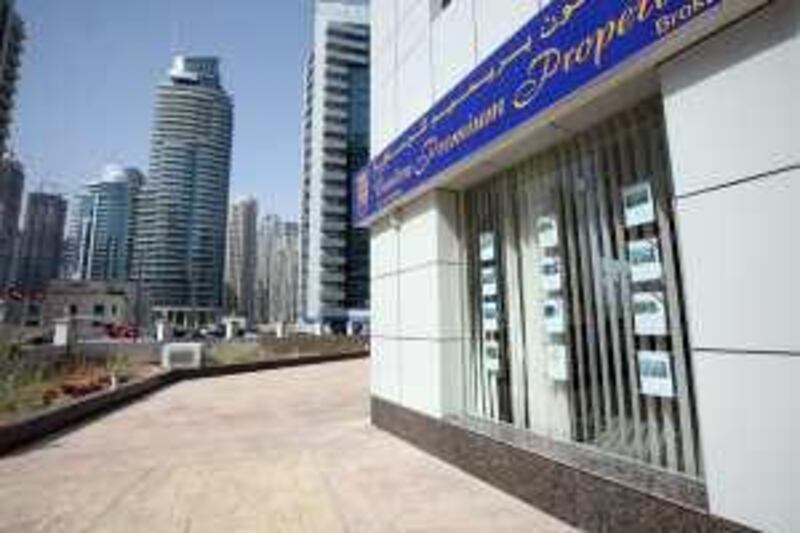Layoffs and consolidations in the property sector have not been limited to developers and contractors. Property agents and brokers have had an equally torrid time, leading to reduced sales, widespread sackings and mergers. There are 1,973 registered brokerages in Dubai and many have had to lay off sales agents. Better Homes, the emirate's largest property brokerage and services company, has reduced its staff from 700 to 500 in the past six months. It is not a unique example. With few transactions around until recently, some companies have even been reduced to trying to sell the business. "We get a lot of offers from smaller brokerage companies to buy the businesses, the trade licences and the shop altogether," says Michael Michael, the director of sales of Landmark Properties. "Last month I personally got four offers. A lot of them have also invested in properties that they can't afford. They have mixed up their business with their own investment. They all have a year's lease and are waiting until the lease runs out." According to Charles Neil, the chief financial officer of Landmark Properties, these are not offers that would interest a larger broker. "It is a people business, and these people may leave the next day and you could be inheriting all sorts of financial problems," Mr Neil says. For James Knowles, a director of Asteco, one of the fundamental flaws in the market is how property brokers are paid. "Many brokers in the UAE are paid a high commission of the value of the transaction and no basic salary or benefits," Mr Knowles says. "So to have any sort of income they have to transact. There is a level of desperation today where they may push for a transaction to happen. It conflicts with the advisory model." A broker worried about how he will pay his rent tomorrow may not be the best adviser. "During the downturn in the property market, a lot of the agents have been made redundant," says Iseeb Rehman, the managing director of Sherwoods. "As a result, these agents are working as freelancers from home, doing a little bit of here and there. All the people I have interviewed recently for a position told me they have been actually freelancing for the last months. What does that mean?" Mr Rehman says it costs a brokerage company between Dh12,000 (US$3,269) and Dh14,000 in fees to have an agent registered with Dubai's Real Estate Regulatory Authority (RERA), provide a visa and process paperwork. Sherwoods has had to lay off 60 per cent of its total workforce since the beginning of the downturn, he says. At Landmark, Mr Neil says, about 10 per cent of the salaried employees out of about 50 have been made redundant and some people who were on salaries have moved on to commission, whereas people on commissions have left on their own accord. Mr Rehman says: "People have been looking for quick fixes as they work, advertising themselves as individuals rather than as registered agents with a broker. There has even been some real estate companies in Dubai where the Ministry of Labour has come in and discovered that nobody was working on company visas." According to Mr Knowles, many property brokers in the UAE are young or have switched to the industry with the idea of becoming rich quickly. As a consequence, some of them do not have a long-term attitude to value a customer's thoughts and work with them over a long period. "In the UAE, there is a lot of people being property brokers today who were doing a different job last year," Mr Knowles says. "And they have still got the immature hunger to rush through and transact to make as much money for themselves as quickly as possible, without knowing that long-term advisory skills warms a client to you, and that client will then stay with you and buy and sell through a long period of time. "This results in an aggressive and pushy approach towards a sale." Larger brokers are trying to find new strategies to stay in the business, from consolidation to focusing on other areas. According to Vincent Easton, the director of sales at Engel and Volkers, there is still a lot going on in the rental market, particularly in some established communities such as The Springs or Dubai Marina. Because many properties have been delivered now in Dubai, property management is another interesting field. "What we have done new is that we have had a couple of new licences, including property management and valuations," Mr Neil says. "We have had a property management licence last year and started the activity already. "We will be doing more of it this year. It is expensive to go into that area. "You need to get a licence and to put up Dh5 million as a guarantee for that licence. It is not something that everybody could do." Landmark's plans to open offices overseas have been dropped and the company has consolidated some branches. Instead of two sales offices in Dubai, Landmark now has one. Sherwoods is considering new applications now that the market seems to have stabilised, Mr Rehman says. "You consolidate, you maximise at the minimum cost," he says. "We have consolidated at the level we wanted to be at, so we are comfortable with where we are now. You adapt to the market changes. Now we are hiring again. This is a recent development." ngillet@thenational.ae
Forgotten victims of the slump
Analysis Layoffs and consolidations in the property sector have not been limited to developers and contractors.

Editor's picks
More from the national





